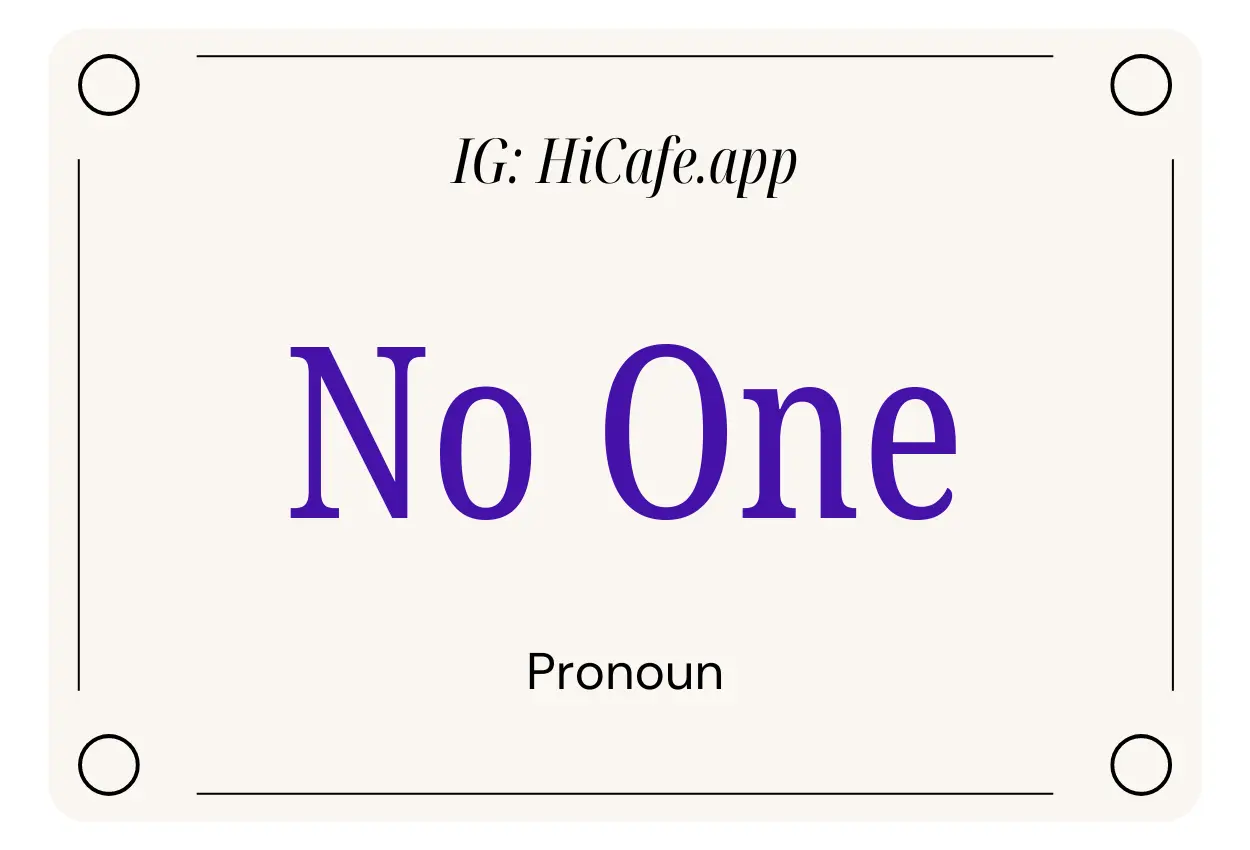Grammar Pronoun- Lesson Fourteen- No One Pronoun Definition
In this grammar lesson, you learn about No One Pronoun definition in English and how to use it in your English conversation and writing. Just follow examples and write them down a few times to learn them very well. After finishing this lesson, you should work on its quiz.
Grammar Recap
In our previous lesson, we covered the Anyone Pronoun Grammar If you just landed on this page, we suggest that you complete our previous lesson including its quizzes before continuing on this lesson.
Requirement Lessons
There is no required lessons for working and learning this lesson.
No One Pronoun Meaning
(indefinite pronouns)
singular
| subject | object | possessive adjective | possessive pronoun | reflexive pronoun |
|---|---|---|---|---|
|
no one nobody
|
no one nobody
|
no one’s nobody’s
|
no one’s nobody’s
|
X |
Use “no one” or “nobody” when describing the absence of people or when exaggerating a very small number of people.
subject = no one or nobody
No one is in the classroom.
There’s nobody here.
no one / nobody
No one visits this gallery.
This is an exaggeration. Actually, some people visit, but it’s a very small number.
No one in gallery
Is no one home?
Is there nobody inside?
While it’s possible to ask questions with “no one” or “nobody,” it can sound a little strange. It’s better to use “anyone” or “anybody” in this case.
No one is home.
object = no one or nobody
Tom told nobody about his new car.
He wants no one to know until next week.
You can also say, “Tom didn’t tell anybody about his new car.”
possessive adjective = no one’s or nobody’s
A: Whose fault is it that the boat tipped over?
It’s nobody’s fault. The wind did it.
possessive pronoun = no one’s or nobody’s
A: Whose piece of pie is this?
B: It’s nobody’s. You can have it.
reflexive pronoun = 0
Remember:
1. There’s really no difference in meaning between the words “no one” and “nobody,” but “no one” is two words while “nobody” is one word.
2. Don’t use negative verbs with “no one” or “nobody.” This creates a double negative, which is commonly heard in American English, but it is a mistake.
I didn’t see nobody in the store. (incorrect)
I saw nobody in the store. (correct)
I didn’t see anybody in the store. (correct)
There ain’t nobody here. (incorrect)
Nobody is here. (correct)
There isn’t anybody here. (correct)
3. The ‘s is used for contractions and for possessive forms.
Nobody’s home.
(nobody’s = nobody is)
This is no one’s business but mine.
(no one’s = possessive adjective)
. . . . . . . . . . . . . . . . . . . . . . . . . . . . . . . . . . . .
Exercise 14
Fill in the blanks with….
no one no one’s
1. __________ watching.
2. __________ is at home.
3. This belongs to __________.
4. I answered the phone, but __________ was there.
5. Whose is this? It’s __________.
6. __________ knows the answer.
7. __________ got time.
8. This is __________ fault.
9. __________ wants to see that movie.
10. The question was directed at __________ in particular.
Answers: 1. No one’s; 2. No one; 3. no one; 4. no one; 5. no one’s; 6. No one; 7. No one’s; 8. no one’s; 9. No one; 10. no one.
Answers 5 and 8 are possessive.
Answers 1 and 7 are contractions.
Private Lessons in English
If you need help with quizzes of this lesson, you can hire one of our expert private English teachers by going to our Private English Tutoring page and submit a request. When submitting your request, make sure to mention the grammar level and lesson number.
Next Grammar Lesson
In our next lesson, we will cover the Definition of Pronoun One Before moving to the next lesson, we suggest that you complete this lesson including its quizzes.
Related Grammar Lessons
None
Grammar Pronoun Outline
If you wish to explore all lessons that are covered in HiCafe Grammar Pronoun, you should visit the Review of English Pronoun Words page.
Practice English Grammar Skills
For a comprehensive practice of English grammar with quizzes, you can visit the Improve English Grammar Skills page to view HiCafe 250 grammar lessons in 7 levels plus prepositions and pronouns.
